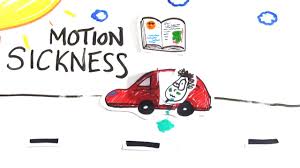Motion sickness is a nauseated feeling that occurs mostly in people while travelling.

Risk factors:
Some factors that may increase your chances of developing motion sickness include:
- Age – being a child aged between about 2-12 years old
- Sex – being a woman, particularly during pregnancy or menstruation;
- Poor ventilation, particularly when there are also strong fumes or food smells
- High levels of stress, fear or anxiety
- Being prone to migraines, and;
- Taking medications that increase nausea, such as certain contraceptives, antidepressants, antibiotics or opiates.

Symptoms:
The symptoms of motion sickness are as follows :
- Nausea
- Headache
- Dizziness
- Vomiting
- Fast, shallow breathing
- Sweating
- Turning pale
- Tiredness
In most cases, these symptoms pass after motion has stopped. However, in a small number of cases, dizziness and nausea may continue after a journey has ended.
Cause:
The brain receives signals about motion and balance from three main areas: the eyes, inner ears and muscles. Motion sickness occurs when unusual movements send conflicting signals to your brain. For example, some unusual movements that may occur during car travel could include winding through the mountains, passing over a bumpy surface or driving in circles.
Of the three areas that are responsible for sensing motion, the structures of the inner ear are thought to be the most important. The inner ear contains three fluid-filled tubes arranged at different angles, known as the semicircular canals.
As the head moves, fluid flows through the semicircular canals, sending information to the brain about the speed, direction and distance of the movement. Together, these structures in the inner ear make up the body’s balance centre, known as the vestibular system.
If you are sitting still during a journey, information on this lack of movement is sent to the brain by your inner ear and muscles. In contrast, your eyes are signalling that you’re travelling at speed. These mixed messages trigger the symptoms of motion sickness.
🔥48 Views






1 Comment
Treatment of motion sickness - NAMAT blog
(October 8, 2018 - 5:08 pm)[…] Motion sickness […]